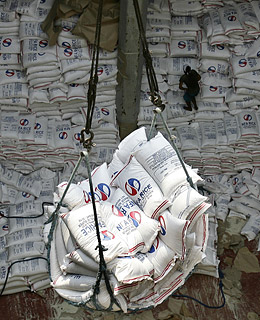
Filipino workers arrange sacks of rice imported by the Philippine National Food Authority in Manila on March 27
When leaders from the Group of Eight (G-8) industrialized countries meet for a three-day summit in the Japanese resort town of Toyako beginning July 7, they'll be confronting a tougher set of economic challenges than the world has faced in many years. The global economy is slowing, the credit crisis appears to be spreading, oil prices are soaring, inflation is rising, stock markets are plummeting — throw in a looming recession in the U.S., the G-8's largest member, and it's hard to see which problem needs the greatest attention from world leaders.
The rapid rise in the price of food certainly looms large as a threat to economies and governments. Japan's Prime Minister Yasuo Fukuda, the host of the G-8 summit, pledged to make the issue one of the priorities in Toyako. Consumer prices for food in the member countries of the Organization for Economic Co-operation and Development (OECD) were up 6.1% year-on-year in May. Increasing demand for food and energy in developing countries, such as China and India, continues to drive up commodities prices. Meanwhile, biofuel production, which diverts grain into gas tanks, and crop failures due to drought are also constraining food supplies. To maintain domestic supplies and keep prices under control at home, nearly 30 countries are limiting food exports of comestibles such as rice, wheat and grain — moves which exacerbate shortages in other nations.
Japan is already trying to address global supply shortages by releasing for export more than 300,000 tons of rice from its 1.5 million-ton rice stockpile. Japan has also agreed to provide an emergency food package of $100 million mainly to African countries. At the summit, the spotlight will be on other wealthy nations to do more. World Bank President Robert Zoellick and United Nations Secretary-General Ban Ki-moon have urged the G-8 to deliver on measures such as those agreed to at a food summit in Rome last month, including removal of export restrictions and reductions in market-distorting subsidies that rich nations use to protect their agricultural sectors from foreign competition.
Countries are also being forced to deal with record oil prices. Consumer prices for energy in OECD countries rose by 14.6% in May compared with May 2007. Many nations that subsidize fuel costs, among them China, Indonesia and Malaysia, no longer can afford to shelter consumers and businesses from higher oil prices. Cutting gasoline and other subsidies "is not an easy process," says James Stewart, chief economist of Weavering Capital, a London-based asset management and macro economic research firm. "It is potentially politically and socially disruptive for these economies." But keeping fuel artificially cheap inflates demand and puts even more pressure on prices. "It has to be done for demand to cool off," Stewart says. "It's not an easy option. But there are no easy options."
With oil prices likely to remain high due to long-term supply constraints and higher global demand, businesses around the world are facing an oil shock that could badly dent profits in the coming year. A quarterly survey released July 1 by the Bank of Japan shows that Japan's business confidence is at a five-year low. To keep economies stable, governments should be prepared to offer financial support, says Jesper Koll, Japan director for Singapore-based Tantallon Capital. "Governments should offer sizable incentives — lower taxes, special depreciation rules, or outright subsidies — for the private sector to develop and invest in more energy efficient homes, cars, and factories," says Koll. "The enormous trade shock that the world is experiencing now calls for quite radical counter-policy." The question is: how radical will the debate be at the G-8 summit?